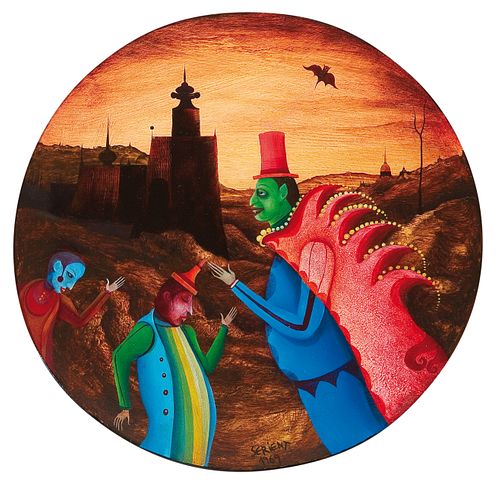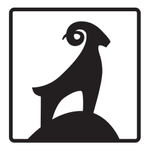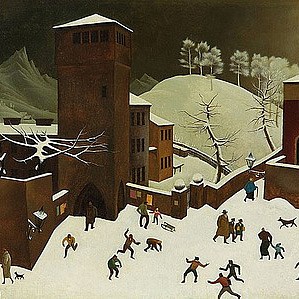HERMANN SERIENT (born 1935 in Melk) Vampires, 1969
Lot 232
Estimate:
EUR€4,000 - EUR€8,000
$4,347.83 - $8,695.65
Absentee vs Live bid
Two ways to bid:
- Leave a max absentee bid and the platform will bid on your behalf up to your maximum bid during the live auction.
- Bid live during the auction and your bids will be submitted real-time to the auctioneer.
Bid Increments
| Price | Bid Increment |
|---|---|
| EUR€0 | EUR€10 |
| EUR€100 | EUR€50 |
| EUR€700 | EUR€100 |
| EUR€1,000 | EUR€200 |
| EUR€3,000 | EUR€300 |
| EUR€3,600 | EUR€400 |
| EUR€4,000 | EUR€500 |
| EUR€7,000 | EUR€1,000 |
| EUR€16,000 | EUR€2,000 |
| EUR€30,000 | EUR€3,000 |
| EUR€36,000 | EUR€4,000 |
| EUR€40,000 | EUR€5,000 |
About Auction
By Widder Auctions
May 19, 2022
Set Reminder
2022-05-19 11:00:00
2022-05-19 11:00:00
America/New_York
Bidsquare
Bidsquare : Masterpieces
https://www.bidsquare.com/auctions/widder-auctions/masterpieces-9287
Masterpieces of classical modernism by Austrian and international artists coming up for auction in Vienna on May 19th Widder Auctions office@widderauktionen.com
Masterpieces of classical modernism by Austrian and international artists coming up for auction in Vienna on May 19th Widder Auctions office@widderauktionen.com
- Lot Description
HERMANN SERIENT*
(born 1935 in Melk)
Vampires, 1969
oil and egg tempera/wood, 24,4 x 25 cm
signed Serient and dated 1969
verso label Gallery Peithner Lichtenfels 1969, titled Vampire
Provenance: private property Vienna
ESTIMATE °€ 4.000 - 8.000
Austrian artist of the 20th century. Lives and works in Vienna and southern Burgenland. Completed an apprenticeship as a goldsmith, lived in Vienna in the 1960s as an artist, cartoonist for the Wiener Arbeiterzeitung and jazz musician, and traveled through Europe by car stop. He experimented with homemade instruments, took photographs and made animated films for the ORF. From the 1970s, as a forerunner of the green movement, social and environmental themes in his work. Works in old master technique like the representatives of Magic Realism and the Viennese School of Fantastic Realism Ernst Fuchs, Arik Brauer, Rudolf Hausner and Wolfgang Hutter. Interest in works by Hieronymus Bosch and Pieter Breughel. Grotesque, enigmatic, fairy-tale and mystical elements as in Surrealism. Themes and motifs always related to the present, social criticism and pointing out environmental destruction. Also comic and humorous elements as in the depictions of the vampire. Luminosity of colors by mixing the pigments, oil paints and egg tempera. 2005 and 2015 exhibitions at the Landesgalerie Burgenland in Eisenstadt.
When Hermann Serient, a young goldsmith and jazz musician from Melk, hitchhiked in the 1950s, financed by engagements as a trombonist and drummer, to see the art of the "old masters" up close in Europe's museums, he was particularly interested for the painting of Hieronymus Bosch or Bruegel, for the handling of the material by Dutch Renaissance painters. Like these, Seriet always uses his own paints, which he does not mix on the palette but applies to the picture support, preferably wood, in many thin layers until he achieves the desired color tone. In 1965, Serient moved to the south of Burgenland, where he completely relocated his life for a few years and where he still lives today. The archaic and hermetic world that he found in the villages of the "Heanzen" appeared to the city dweller Serient as completely new and incomprehensible; however, he quickly made friends personally. The fascination he felt in view of the primitive building forms, the different way of speaking and clothing in every village and last but not least the traditional festivals and rituals, which must have seemed mysterious and bizarre to the outsider, became a main source of inspiration for the artist and also found outside of his famous Heanzen -cycle their precipitation. Originally characterized by caricature and influenced by the expressionism of George Grosz or Alfred Kubin, the densely populated sceneries now showed clear parallels to his new role models Bosch and Bruegel. He was often pigeonholed with the Viennese artists of Fantastic Realism, which Serialt has always rejected. For him, art only has value if it has content and doesn't lose itself in random whimsicality. Thus, series not only took sides for the declining, independent culture of the Heanzen, but increasingly dealt with environmental issues and other political issues. The vampire, before whom the two much smaller men bow in awe, is a barely encoded warning against charlatanry, paternalism and exploitation. The profiteers of social inequality appear here as creepy bloodsuckers.
PLEASE NOTE:
The purchase price consists of the highest bid plus the buyer's premium, sales tax and, if applicable, the fee of artists resale rights. In the case of normal taxation (marked ° in the catalog), a premium of 24% is added to the highest bid. The mandatory sales tax of 13% is added to the sum of the highest bid and the buyer's premium. The buyer's premium amounts to 28% in case of differential taxation. The sales tax is included in the differential taxation. - Shipping Info
-
Shipping
We will send you the invoice shortly after the auction. As soon as we have recieved the amount, the art can be picked up at Johannesgasse 9-13, 1010 Vienna. Please note that the buyer is responsible for pick-up and shipping of the lot.
Should you wish to ship your items, please contact: Mailboxes Email: oper@mbe-co.at Tel: 01 5128855
Please note that storage fees may apply, should the pieces not be picked up within 14 days after invoicing for domestic and 28 days for international transportation.
Our team will be happy to assist you with any further information at office@widderauktionen.com or at 0043 676 555 66 10.
-
- Buyer's Premium



 EUR
EUR CAD
CAD AUD
AUD GBP
GBP MXN
MXN HKD
HKD CNY
CNY MYR
MYR SEK
SEK SGD
SGD CHF
CHF THB
THB













